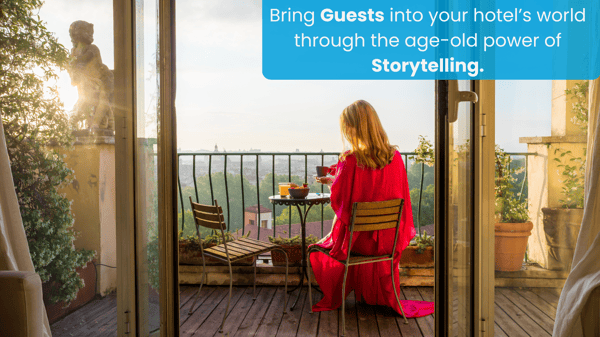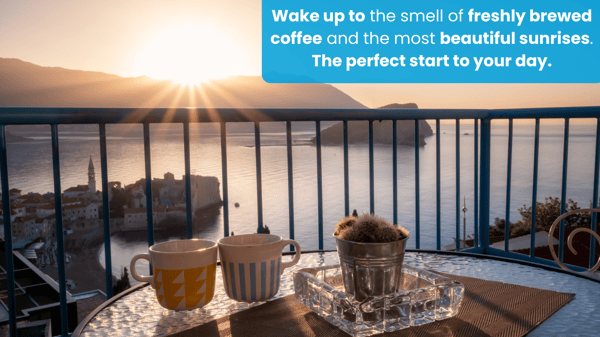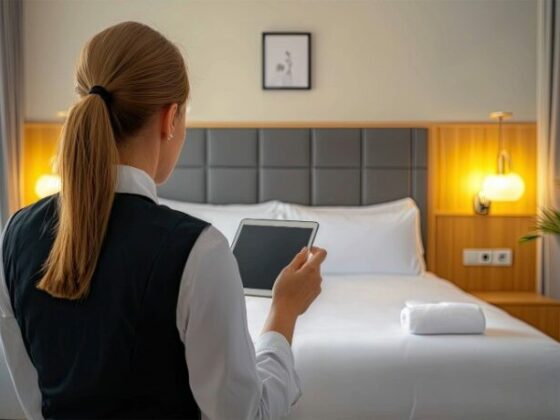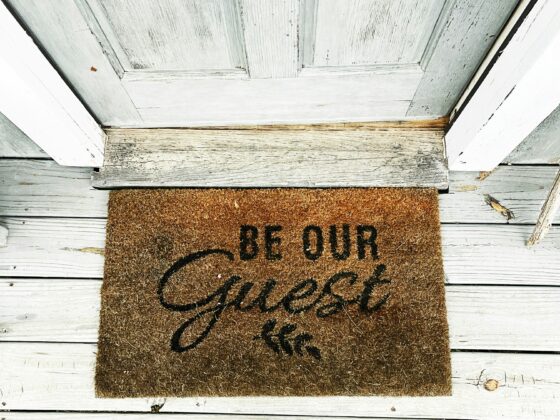Let’s be honest, a lot of hotel marketing sounds the same these days: “Luxury rooms”, “Friendly staff”, “Perfect location”, “Nestled”. Yawn! In the modern world, where copy-and-paste templates and AI-generated copy are everywhere, it’s easy to create content, but all it does is blend in. When every hotel sounds alike, it becomes harder to stand out and truly connect with guests. Writing content that resonates with audiences is about bringing them into your hotel’s world through the age-old power of (good) storytelling.
Imagine you’re searching for a place to stay on your next holiday and come across two websites. One says, “We offer clean rooms, coffee, and free Wi-Fi.”
The other says: “Wake up to the smell of freshly brewed coffee on your balcony as the morning sun lights up the city skyline. Our cosy rooms are made for you to relax, recharge, and create memories that last a lifetime.”
Which one makes you want to book? Guests don’t just want facts; they want stories that spark their imagination and connect with their emotions. They want to know the passion behind your hotel and the special moments waiting for them.
Storytelling isn’t about fairy tales. It’s about sharing honest, meaningful experiences that invite guests to be part of your hotel’s unique story. In this article, we’ll explore how storytelling can transform your marketing, make your website copy more engaging, your blog more compelling, and help your hotel get more bookings.

Shaping Your Brand Through Storytelling
Define Your Origin and Purpose
Every hotel has an origin story. Maybe it started as a family dream, a renovation of a forgotten building, or a passion for sustainable travel. Sharing the ‘why’ behind your business helps guests connect to the people and principles behind the brand. It builds authenticity, which is one of the most powerful drivers of guest loyalty today.
Your origin story doesn’t have to be dramatic, as long as it’s honest. Were you inspired by local culture? A favourite childhood holiday spot? A commitment to doing hospitality differently? These simple, heartfelt motivations make you relatable, and even when you don’t overtly state them, understanding the elements of your origin story will help you write more interesting content.

Bring Characters to Life
Great stories need memorable characters. Introduce your team: the receptionist who remembers returning guests’ names, the chef who works with local farmers, or the gardener who is an award-winning landscaper. These real people add warmth and personality, turning a faceless business into a living, breathing experience.
As hospitality legend Rocco Forte once said, “The staff at the end of the day are the service. The people who work in the hotel interacting with the guest are creating the product, they are the people who are important, they are the ones who make it happen.” When guests see the human side of your hotel, they’re more likely to book and more likely to return.
Find out how to use your hotel’s reviews to train and motivate staff
Stay True to Your Values
Your brand story should reflect your values. Whether it’s sustainability, community, luxury, or relaxation, thread these values consistently through everything you do — from your décor and amenities to your tone of voice online.
Telling a cohesive story across all platforms helps reinforce your brand identity. It’s not just what you say, it’s how you live it. A cohesive story is a memorable one, and one people will want to experience and share again.

Using Storytelling to Strengthen Your Website Copy
Make a Strong First Impression
Your website is often the first place potential guests interact with your brand. Instead of cold, generic phrases like “quality service” or “great amenities,” bring your offering to life with sensory, emotional language. For example:
“Wake up to the sound of birdsong and the smell of freshly brewed coffee, with views of rolling hills just beyond your window.”
This paints a picture and invites guests to imagine themselves there. Good copy should feel like a conversation, not a brochure.
Design matters as well as copy – take a look at these tips to drive direct bookings
While we’re on the subject of first impressions, a good tip is to front-load your value proposition. Use your opening lines to showcase what truly sets you apart. Whether it’s your lakeside setting, your rooftop bar, or your locally inspired breakfasts, lead with the detail that matters most to your ideal guest. If they only read one sentence, make it count.
Balance Emotion with Information
While storytelling adds warmth, clarity is key. Make sure essential information is clear: room types, facilities, pet policies, and parking. But frame these details in a way that aligns with your brand’s tone.
For instance, instead of saying “We offer free parking,” you might say:
“Enjoy stress-free arrivals with complimentary parking just steps from your door.”
You’re still delivering key info, but doing so with a guest-first mindset. Mention small, guest-oriented details (“No stairs required” or “Late check-out available on request”) to ease worries and build trust. These little touches show empathy and can make the difference between hesitation and a confirmed booking.
Align Copy with Your Guest Experience
Think about the guests you attract or hope to attract. Are they romantic couples, business travellers, digital nomads, or families? Match your language to their expectations.
Here are 10 types of travellers you could be attracting to your hotel
For example, a coastal retreat for couples might use soft, poetic phrasing. A modern city hotel for business travellers might use sharper, more concise copy. The goal is to help your ideal guest feel like your hotel was made for them.
Top tip: Use guest feedback to understand what matters to your guests, and communicate it in a way that sounds authentic and relatable.

Blogging: Your Ongoing Storytelling Platform
Create Evergreen Content That Delivers Long-Term Value
A blog lets you be part of someone’s travel plans before they’re even conscious of making them, and continue the story long after a guest has left your website. It’s not about sales pitches, it’s about adding value. Blog posts like “Top 5 Dog-Friendly Walks Near (Your Hotel)” or “What to Pack for a Winter Break in (Your Town)” attract readers through useful content while showcasing your local expertise.
Unlike social media posts that vanish quickly, blog content is evergreen: it keeps showing up in searches for months or even years.
Blogs aren’t just for inspiration, though. They can also nudge potential guests closer to booking. When readers connect with your stories and see themselves in the experiences you describe, they’re more likely to take action. Include subtle calls-to-action like “Check availability for your winter break” or “Meet the team who’ll make your stay special” to gently guide readers toward hitting the “book now” button.
Take a look at some tactics from online shopping that convince website visitors to “book now”
Share Stories That Resonate
Blogging is the perfect place to highlight memorable guest experiences, behind-the-scenes moments, or local community involvement. Tell the story of a proposal that happened on your property, your head chef’s passion for foraging, or how your hotel partnered with a nearby animal shelter.
These stories make your hotel relatable, human, and memorable. They also give potential guests a reason to choose you over competitors with less personality.
Strengthen Your SEO (Without Sounding Like a Robot)
Google loves fresh, relevant content, and blogging helps deliver exactly that. But strong SEO doesn’t mean keyword stuffing. Focus on writing naturally, with phrases your guests might actually search.
Find out what Google’s new AI tools mean for hotel marketing
Instead of awkwardly repeating “best hotel in [a certain town],” focus on terms that match search intent, like “romantic weekend getaway in the Overberg” or “pet-friendly hotels near Snowdonia.” Then write content that supports that phrase organically.
Blogging is a long-term strategy, and tools like Google Analytics or Search Console can help you see what content resonates most. Look at which posts get traffic, keep readers on your site, or lead to bookings. Search engines reward genuinely helpful, well-written content, and so do people.

Practical Tips to Strengthen Your Storytelling
Know Who You’re Talking To
The more you understand your audience, the easier it is to speak their language. Use guest feedback, online reviews, or even informal chats to build personas. Are your guests seeking adventure, comfort, luxury, or peace and quiet? Reflect these motivations in your copy.
Make Your Content Easy to Read
People scan online and don’t always read every word. Use short paragraphs, clear headings, bullet points, and simple language. Avoid jargon or overly formal phrases.
Instead of: “Our establishment provides guests with a comfortable, luxurious experience.” Try: “We make every stay feel like a treat — with cosy touches and warm hospitality.”
Avoid Clichés and Generic Phrases
Phrases like “world-class service” or “unbeatable location” don’t mean much; you need to be specific… What makes your service world-class? What exactly is unbeatable about your location?
If your breakfast includes homemade granola and locally roasted coffee, say that. If your rooms overlook vineyards or historic rooftops, describe that. Specificity is what brings copy to life.
Use Visuals to Tell Stories
Your copy is important, but it has to be supported by compelling visual content. Enticing images of your property that allow the viewer to imagine themselves there have been a staple of hotel marketing since the days of the print brochure, and the modern obsession with short-form video (YouTube Shorts recently reported 200 billion daily views) is a great opportunity to pack more of your hotels story into less time.
When you’re creating visual stories, high-quality photos are essential, but even a simple video captured on a smartphone (like your chef foraging for ingredients or the view from a favourite room) can add personality and depth. Just make sure your visuals align with your brand and tell a story worth sharing.
Let Real Guests Do the Talking
Testimonials and reviews are powerful. Sprinkle them throughout your website and blog to build trust and support your story. Even better — turn them into mini-stories.
Example:
“We loved waking up to the sound of church bells and sipping our morning coffee in the garden courtyard. It was the perfect escape from city life.” Mary and John, from London
Real words from real guests build credibility better than any sales pitch ever could.
Be Consistent Across Channels
Make sure your story and tone carry through everywhere — your website, blog, social media, booking platforms, and even email replies. A consistent voice strengthens your brand and builds recognition.
If you’re friendly and down-to-earth on your blog, don’t sound stiff and formal in your confirmation emails. Everything should feel like it’s coming from the same place.
Your hotel doesn’t need to have one repetitive narrative, though. Rather, think about day-to-day activities or features as unique chapters within the story of your hotel. Magic moments that happen around your infinity pool, your head chef explaining how to make a particular dish, or some photos showing what you’re planting in your veggie garden this season can be shared individually, but all be packaged so they align with your overarching brand values and voice.

The Bottom Line: Tell the Story Only You Can Tell
At the end of the day, people don’t fall in love with hotel amenities… they fall in love with how a place makes them feel. And that feeling often starts long before they arrive, with the words and stories you choose to share.
Storytelling isn’t just a marketing trick; it’s a way to show your heart, your passion, and the little details that make your hotel more than just a place to sleep. You don’t need fancy words or a marketing degree. You just need to be real. Share the moments that matter, the people behind the scenes, and the experiences guests will never forget.
Because when you lead with a story, you don’t just sell a stay, you create a connection. And in hospitality, that’s what truly sets you apart.







